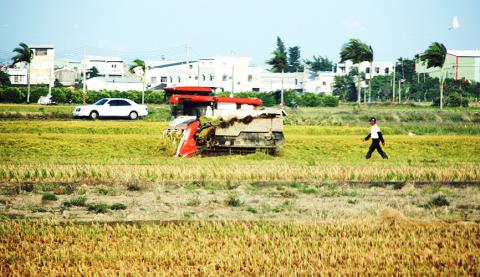The plight of a 69-year-old farmer who attempted to commit suicide after being unable to salvage his crops in time to avoid further damage caused by the recent rains has attracted officials’ attention to the delayed delivery of mechanical reapers to farmers.
The Chinese-language United Daily News yesterday reported that the farmer from Dounan Township (斗南) in Yunlin County, surnamed Lin (林), drank pesticide in a fit of despair the night after he had waited in vain for mechanical reapers that never arrived.
Lin was one of many farmers in the country rushing to harvest their crops after the heavy downpours that started on June 10 and continued when Tropical Storm Talim hit the country last week, causing flooding that damaged more than 2,400 hectares of rice paddies in the county.

Photo: Lin Yi-chang, Taipei Times
Local media reported that Lin had been found by his son after drinking a 0.5 liter bottle of pesticide on Saturday. Lin was rushed to a hospital for emergency treatment and was transferred yesterday to a non-intensive care ward, still suffering from bleeding of the stomach.
Premier Sean Chen (陳冲) yesterday told reporters that the problem did not lie in a lack of mechanical reapers, but in the scheduling process for their use.
If the Yunlin County Government had better coordinated the dispatch of mechanical reapers to its farmers, they would have been available to them in time to save more crops, he said.
Taiwan has 2,042 mechanical reapers available for rent and Yunlin County has 200 of those, Chen said.
Separately, Democratic Progressive Party Legislator Hsueh Ling (薛凌) said the Ministry of National Defense should send soldiers to help with harvesting.
Ministry spokesman Major General David Lo (羅紹和) responded to Hsueh’s call by pointing out that it was the responsibility of local governments to help with the harvest work.
He also said that the downsizing of the military in recent years and the shortening of mandatory military service means the ministry can no longer provide assistance to farmers as it did in the 1970s and 1980s.
In addition, most soldiers now are unfamiliar with farm work, Lo said.
According to the Council of Agriculture, rice losses since June 10 had reached NT$218.05 million (US$7.28 million) as of yesterday, while total agricultural losses stood at NT$976.63 million.
Additional reporting by CNA

INVESTIGATION: The case is the latest instance of a DPP figure being implicated in an espionage network accused of allegedly leaking information to Chinese intelligence Democratic Progressive Party (DPP) member Ho Jen-chieh (何仁傑) was detained and held incommunicado yesterday on suspicion of spying for China during his tenure as assistant to then-minister of foreign affairs Joseph Wu (吳釗燮). The Taipei District Prosecutors’ Office said Ho was implicated during its investigation into alleged spying activities by former Presidential Office consultant Wu Shang-yu (吳尚雨). Prosecutors said there is reason to believe Ho breached the National Security Act (國家安全法) by leaking classified Ministry of Foreign Affairs information to Chinese intelligence. Following interrogation, prosecutors petitioned the Taipei District Court to detain Ho, citing concerns over potential collusion or tampering of evidence. The

‘FORM OF PROTEST’: The German Institute Taipei said it was ‘shocked’ to see Nazi symbolism used in connection with political aims as it condemned the incident Sung Chien-liang (宋建樑), who led efforts to recall Democratic Progressive Party (DPP) Legislator Lee Kun-cheng (李坤城), was released on bail of NT$80,000 yesterday amid an outcry over a Nazi armband he wore to questioning the night before. Sung arrived at the New Taipei City District Prosecutors’ Office for questioning in a recall petition forgery case on Tuesday night wearing a red armband bearing a swastika, carrying a copy of Adolf Hitler’s Mein Kampf and giving a Nazi salute. Sung left the building at 1:15am without the armband and apparently covering the book with a coat. This is a serious international scandal and Chinese

Seventy percent of middle and elementary schools now conduct English classes entirely in English, the Ministry of Education said, as it encourages schools nationwide to adopt this practice Minister of Education (MOE) Cheng Ying-yao (鄭英耀) is scheduled to present a report on the government’s bilingual education policy to the Legislative Yuan’s Education and Culture Committee today. The report would outline strategies aimed at expanding access to education, reducing regional disparities and improving talent cultivation. Implementation of bilingual education policies has varied across local governments, occasionally drawing public criticism. For example, some schools have required teachers of non-English subjects to pass English proficiency

TRADE: The premier pledged safeguards on ‘Made in Taiwan’ labeling, anti-dumping measures and stricter export controls to strengthen its position in trade talks Products labeled “made in Taiwan” must be genuinely made in Taiwan, Premier Cho Jung-tai (卓榮泰) said yesterday, vowing to enforce strict safeguards against “origin laundering” and initiate anti-dumping investigations to prevent China dumping its products in Taiwan. Cho made the remarks in a discussion session with representatives from industries in Kaohsiung. In response to the US government’s recent announcement of “reciprocal” tariffs on its trading partners, President William Lai (賴清德) and Cho last week began a series of consultations with industry leaders nationwide to gather feedback and address concerns. Taiwanese and US officials held a videoconference on Friday evening to discuss the